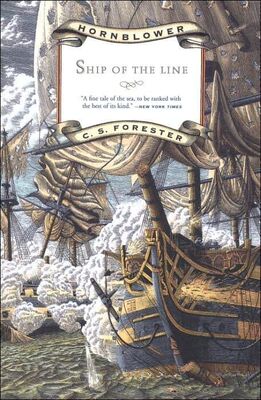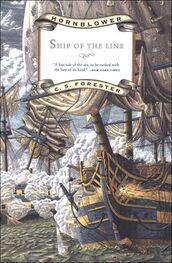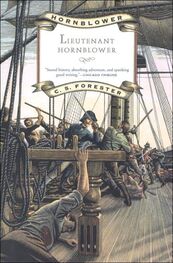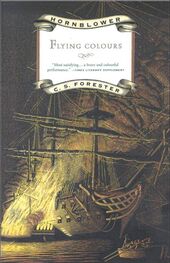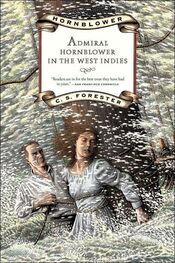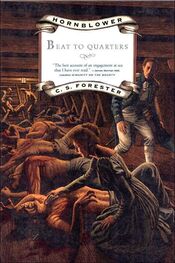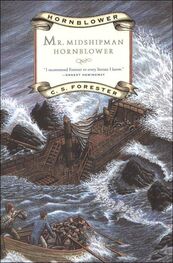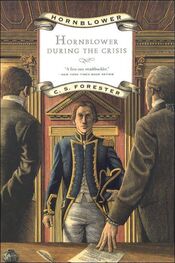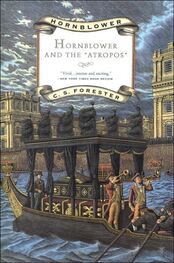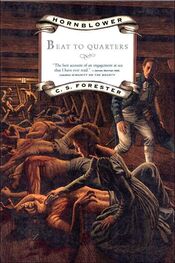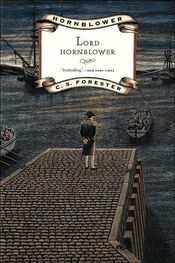Then there was a pause. Savage was not too sure of what he could see.
“What is it, Mr. Savage?”
“I think—I’m not quite sure, sir—there’s another sail, right on the horizon, sir, abaft the enemy’s beam.”
Another sail! It might be a stray merchant ship. Otherwise it could only be Leighton’s ships or the Cassandra.
“Keep your eye on her, Mr. Savage.”
It was impossible to wait for news. Hornblower swung himself up into the shrouds and climbed upwards. At Savage’s side he trained his glass in the direction indicated. For a second the French squadron danced in the object glass, disregarded, as he searched.
“A bit farther round, sir. About there, I think, sir.”
It was the tiniest flash of white, too permanent for a wave crest, of a different shade from the few clouds against the blue. Hornblower nearly spoke, but succeeded in limiting himself to “Ha-h’m.”
“It’s nearer now, sir,” said Savage, telescope to eye. “I should say, sir, it’s a ship’s fore-royal.”
There could be no doubt about it. Some ship under full sail was out there beyond the Frenchmen, and standing in to cross their wake.
“Ha-h’m,” said Hornblower. He said no more, but snapped his telescope shut and addressed himself to the descent.
Bush dropped to the deck to meet him from the shrouds he had ascended; Gerard, Crystal, they were all on the quarterdeck eyeing him anxiously.
“The Cassandra ,” said Hornblower, “standing in towards us.”
By saying that, he was risking his dignity to demonstrate his good sight. No one could guess the new arrival to be the Cassandra from just that glimpse of her royals. But it could only be the Cassandra who would be on that course, unless his judgment were sadly at fault. Should she be revealed not to be, he would appear ridiculous—but the temptation to appear to recognise her when Savage was not even sure whether she was a ship or a cloud was too strong.
All the implications of the Cassandra’s appearance were evident to the officers’ minds at once.
“Where’s the flagship and Caligula ?” demanded Bush, of no one in particular.
“May be coming up, too,” said Gerard.
“The Frogs are cut off if they are,” said Crystal.
With the Pluto and Caligula to seaward of them, and the Sutherland to landward, Palamos Point to windward, and a fluky wind veering foul, it would be only by good fortune they could escape a battle. Every eye turned towards the French squadron; they were nearly hull-up now, heading south-by-west closehauled, a three-decker in the van followed by three two-deckers, admiral’s flags flying at the foremasts of the first and third ships. The broad white stripes which decorated their sides stood out sharp and clear in the pure air. If the Pluto and Caligula were far astern of the Cassandra the Frenchmen would still be as much in ignorance of their proximity as was the Sutherland, which would explain why they were still holding their course.
“Deck there!” hailed Savage. “The strange sail’s Cassandra. I can see her tops’l now, sir.”
Bush and Gerard and Crystal looked at Hornblower with a strange respect for his penetrating vision; it had been well worth risking his dignity for that.
The sails suddenly flapped loudly; a puff of wind had followed a comparative lull, and from a more southerly point than before. Bush turned to shout orders for the trimming of the sails, and the others turned instantly to watch the French reaction.
“They’re going about!” said Gerard, loudly.
Undoubtedly they were doing so; on the new tack they would weather Palamos Point but would be standing out to sea nearer to the British squadron—if the British were there.
“Mr. Bush,” said Hornblower. “Put the ship about, if you please.”
“ Cassandra’s signalling, sir,” yelled Savage.
“Up with you!” snapped Hornblower to Vincent and Longley. Telescope and signal book in hand, they raced for the masthead; everyone on the quarterdeck watched their progress anxiously.
“ Cassandra’s signalling to the flagship, sir!” yelled Vincent.
So Leighton was out there over the horizon—over the Frenchmen’s horizon, too, judging from their actions. Bonaparte might send out four French ships to fight three English ones, but no French admiral safely at sea and knowing the capacity of his crews far better than his emperor, would obey those orders if he could help it.
“What’s she saying, boy?” hailed Hornblower.
“She’s too far off to be sure, sir, but I think she’s reporting the enemy’s new course.”
Let the Frenchmen hold that course for an hour, and they were lost, cut off from Rosas and certain to be overhauled before they reached Barcelona.
“They’re going about again, by God!” said Gerard, suddenly.
Wordless, they watched the four French ships come up into the wind, and come over on to the other tack. Then they came round, farther and farther still, until in all four ships their three masts were in line; every one of them was heading straight for the Sutherland.
“Ha-h’m,” said Hornblower, watching his fate bearing down upon him: and again, “Ha-h’m.”
The French lookouts must have glimpsed Leighton’s mastheads. With Rosas Bay six miles under his lee and Barcelona a hundred miles almost to the windward the French admiral could have taken little time to reach a decision in face of those strange sails on the horizon. He was dashing instantly for shelter; the single ship of the line which lay directly in his path must be destroyed if she could not be evaded.
The sick wave of excitement and apprehension which Hornblower experienced did not prevent calculations pouring into his mind. The French had six miles to go with a fair wind. He still did not know whereabouts on the circumference of the possible circle whose centre was the French flagship Leighton was on at the moment But he would have twenty miles, perhaps a little more, to sail for certain, and with the wind—such wind as there was—abeam, if he were in the most advantageous position, and on his port bow if he were far astern. And shifting as it was, it would be dead foul for him in two hours. Twenty to one, Hornblower estimated the odds against the admiral being able to catch the French before they reached the protection of the guns of Rosas. Only unheard-of flukes of wind would do it, and only then if the Sutherland were able to knock away a good many spars before she was beaten into helplessness. So keenly had Hornblower been calculating that it was only then that he remembered, with a gulp of excitement, that the Sutherland was his ship, and the responsibility his, as well.
Longley came sliding down the backstay, the whole height from topmast head to the deck, his face white with excitement.
“Vincent sent me, sir. Cassandra’s signalling, and he thinks it’s ‘Flag to Sutherland, no. 21’. Twenty-one’s ‘Engage the enemy’, sir. But it’s hard to read the flags.”
“Very good. Acknowledge.”
So Leighton at least had the moral courage to assume the responsibility for sending one ship against four. In that respect he was worthy of being Barbara’s husband.
“Mr. Bush,” he said. “We’ve a quarter of an hour. See that the men get a bite to eat in that time.”
“Aye aye, sir.”
He looked again at the four ships all steering slowly down upon him. He could not hope to turn them back, but he could only hope to accompany them in their race to Rosas Bay. Any ship that he could totally dismast would fall a prey to Leighton; the others he must damage so sorely that they could not repair themselves in Rosas, which had the smallest dockyard facilities. Then they would stay there until fireships, or a large scale cutting out expedition, or a properly organised attack by land on the fortress, should result in their destruction. He thought he ought to succeed in that, but he could not bring himself to visualise what would happen to the Sutherland meanwhile. He swallowed hard, and set himself to plan the manoeuvres of the first encounter. The leading French ship mounted eighty guns—they were run out and grinning at him through her open ports, while each of the Frenchmen had, as though in bravado, at least four tricolour flags floating in the rigging. He looked up at the battered red ensign hanging from the peak against the blue of the sky, and then he plunged into realities.
Читать дальше